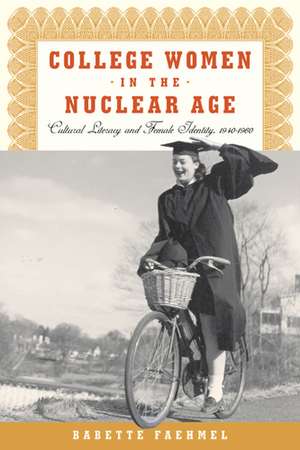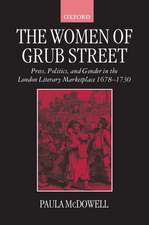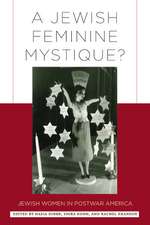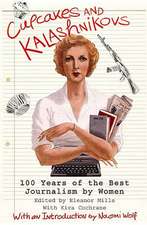College Women In The Nuclear Age: Cultural Literacy and Female Identity, 1940-1960
Autor Professor Babette Faehmelen Limba Engleză Paperback – 14 mar 2013
In the popular imagination, American women during the time between the end of World War II and the 1960s—the era of the so-called “feminine mystique”—were ultraconservative and passive. College Women in the Nuclear Age takes a fresh look at these women, showing them actively searching for their place in the world while engaging with the larger intellectual and political movements of the times.
Drawing from the letters and diaries of young women in the Cold War era, Babette Faehmel seeks to restore their unique voices and to chronicle their collective ambitions. She also explores the shifting roles that higher education played in establishing these hopes and dreams, making the case that the GI Bill served to diminish the ambitions of many American women even as it opened opportunities for many American men. A treasure-trove of original research, the book should stimulate scholarly discussion and captivate any reader interested in the thoughts and lives of American women.
Drawing from the letters and diaries of young women in the Cold War era, Babette Faehmel seeks to restore their unique voices and to chronicle their collective ambitions. She also explores the shifting roles that higher education played in establishing these hopes and dreams, making the case that the GI Bill served to diminish the ambitions of many American women even as it opened opportunities for many American men. A treasure-trove of original research, the book should stimulate scholarly discussion and captivate any reader interested in the thoughts and lives of American women.
| Toate formatele și edițiile | Preț | Express |
|---|---|---|
| Paperback (1) | 308.79 lei 6-8 săpt. | |
| Rutgers University Press – 14 mar 2013 | 308.79 lei 6-8 săpt. | |
| Hardback (1) | 811.20 lei 6-8 săpt. | |
| Rutgers University Press – 5 sep 2011 | 811.20 lei 6-8 săpt. |
Preț: 308.79 lei
Nou
Puncte Express: 463
Preț estimativ în valută:
59.12€ • 61.45$ • 49.01£
59.12€ • 61.45$ • 49.01£
Carte tipărită la comandă
Livrare economică 06-20 februarie 25
Preluare comenzi: 021 569.72.76
Specificații
ISBN-13: 9780813554242
ISBN-10: 0813554241
Pagini: 250
Ilustrații: 1
Dimensiuni: 152 x 229 x 18 mm
Greutate: 0.37 kg
Ediția:First Paperback Edition
Editura: Rutgers University Press
Colecția Rutgers University Press
ISBN-10: 0813554241
Pagini: 250
Ilustrații: 1
Dimensiuni: 152 x 229 x 18 mm
Greutate: 0.37 kg
Ediția:First Paperback Edition
Editura: Rutgers University Press
Colecția Rutgers University Press
Notă biografică
BABETTE FAEHMEL is an assistant professor in the Liberal Arts Division at Schenectady County Community College, where she teaches U.S. and women’s history.
Cuprins
Acknowledgments
Introduction
1. Campus Life in Times of Crisis: "Greasy Grinds," "Coeds," and the Limits of Diversity
2. "But Dad!": Campus Life and Critical Thinking
3. Not Part of the Crowd: Career-Oriented College Women Write about Their Goals, Identity, and Significant Others
4. Individualism and Sexuality: Why Not to Conform
5. College Women and the Clash of Mystiques
Conclusion
Student Diaries and Letters Consulted
Notes
Selected Bibliography
Index
Introduction
1. Campus Life in Times of Crisis: "Greasy Grinds," "Coeds," and the Limits of Diversity
2. "But Dad!": Campus Life and Critical Thinking
3. Not Part of the Crowd: Career-Oriented College Women Write about Their Goals, Identity, and Significant Others
4. Individualism and Sexuality: Why Not to Conform
5. College Women and the Clash of Mystiques
Conclusion
Student Diaries and Letters Consulted
Notes
Selected Bibliography
Index
Recenzii
“An insightful exploration of how college women in the 1940s and 1950s struggled to reconcile their intellectual and sexual drives with the gender constraints of that era. Beautifully researched.”
“This original and fascinating study provides an intimate glimpse into the minds, emotions, hopes, and decisions of 1940s and 1950s college women. Faehmel skillfully shows how young women adhered to and challenged dominant gender norms . . . a lively read!”
"Faehmel challenges Betty Friedan's famous description of young women from liberal arts colleges as dupable consumers who made little use of their education. Faehmel's prose is lively, and her summation of an era that is often ignored in accounts of women's history makes this into a useful book for college classrooms. Undergraduates are particularly likely to connect with the diarists as they ruminate about identity, sexuality, and the life ahead of them. Recommended."
"An important contribution to the literature on the history of women's higher education."
Descriere
In the popular imagination, American women during the time between the end of World War II and the 1960s—the era of the so-called “feminine mystique”—were ultraconservative and passive. College Women in the Nuclear Age takes a fresh look at these women, showing them actively searching for their place in the world while engaging with the larger intellectual and political movements of the times. Drawing from the letters and diaries of young women in the Cold War era, Babette Faehmel seeks to restore their unique voices and to chronicle their collective ambitions.


















